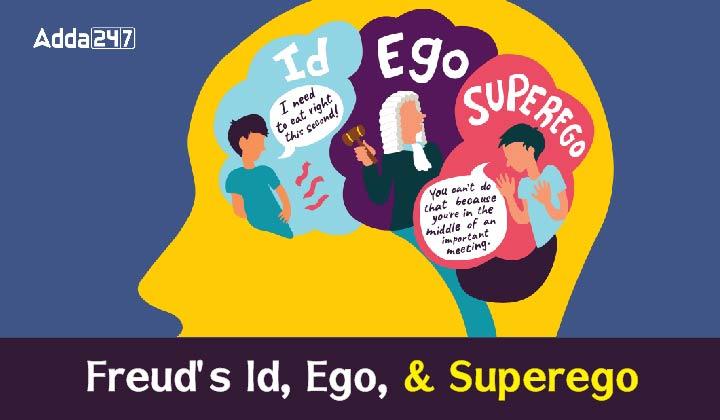In the field of psychoanalytic psychology, Sigmund Freud introduced the concept of Id, Ego, and Superego. According to Freud, the human mind has three distinct components – the Id, the Ego, and the Superego – that interact to shape human behavior and personality. The interplay between these entities is critical in understanding human behavior, and each of them has a specific role to play.
Freud’s Id, Ego, and Superego/ फ्रायड का इदं, अहम्, और पराहम
Freud has divided the entire anatomy of personality in the form of – फ्रायड ने व्यक्तित्व की संपूर्ण शारीरिक रचना विज्ञान को विभाजित किया है
- Id इदं
- Ego अहम्
- Superego पराहम
- Id – Id is the part of the unconscious mind which is seat of beastly and unethical feelings or tendencies. Its function is to distribute immediately the energy or the tension that is generated in the body excited by the internal and external stimulus. Pleasure which Freud has called to be the basic need is fulfilled by id. The purpose of pleasure is to free a person from tension इदं – इदं अचेतन मन का हिस्सा है जो जानवर और अनैतिक भावनाओं या प्रवृत्तियों का आसन है। इसका कार्य आंतरिक या बाहरी उत्तेजना द्वारा उत्तेजित शरीर में उत्पन्न ऊर्जा या तनाव को तुरंत वितरित करना है। खुशी जिसे फ्रायड ने मूल आवश्यकता कहा है वह इदं द्वारा पूरी की जाती है। आनंद का उद्देश्य किसी व्यक्ति को तनाव से मुक्त करना है।
- Id has two tendencies – eithers to seek pleasure or to give in to ego. इदं में आनंद की तलाश या अहंकार को देने के लिए दो प्रवृत्तियां हैं।
- Id makes energy to be restrained instead to being expended. इदं खर्च होने के बजाय ऊर्जा को संयमित बनाती है।
- Id never grows out of infancy throughout life. इदं जीवन भर कभी भी शैशवावस्था से बाहर नहीं होती है।
- Id is emotional, unintelligent, unsocial, selfish and seeker after pleasure. इदं भावनात्मक, अनौपचारिक, भद्दा, स्वार्थी और आनंद के बाद साधक है।
- it is self – contained. यह आत्म – निहित है
- When a person acts under the influence of emotion, then id is at work in him जब कोई व्यक्ति भावना के प्रभाव में कार्य करता है, तो इदं उसके काम में है
- For example, if a person throws a stone at somebody in a flurry ,he is governed by id. Id is thoughtless. It only craves and acts. उदाहरण के लिए, यदि कोई व्यक्ति हड़बड़ाहट में किसी पर पत्थर फेंकता है तो वह इदं द्वारा शासित होता है। इदं विचारहीन है। यह केवल लालसा और कार्य करता है.
- Ego – In Hindi Ego means अहम्. Ego develops when a person’s needs cover ground reality. Ego is steered by the principle of Reality and not by desire for pleasure. Its purpose is to put off the dispersal of energy till the end is realized that will fulfill the need. अहम् – अहम् तब विकसित होता है जब व्यक्ति की जरूरतों को जमीनी वास्तविकता से आच्छादित किया जाता है। अहम् को वास्तविकता के सिद्धांत द्वारा संचालित किया जाता है न कि आनंद की इच्छा से। इसका उद्देश्य ऊर्जा के फैलाव को तब तक के लिए दूर रखना है जब तक कि यह महसूस न हो जाए कि जरूरत पूरी हो जाएगी।
For example, the child has to learn that everything is not to be put into the mouth when hungry. He has to learn to distinguish food from other inedible things. He has to put off eating till he sees the food. Otherwise the experience can be bitter. उदाहरण के लिए, बच्चे को सीखना होगा कि भूख लगने पर सब कुछ मुंह में नहीं डालना है। उसे भोजन को अन्य अखाद्य चीजों से अलग करना सीखना होगा। उसे तब तक खाना बंद करना पड़ता है जब तक कि वह खाना न देख ले। अन्यथा अनुभव कड़वा हो सकता है।.
- A person who is well – adjusted is heaped by his ego in the accomplishment of his tasks. It controls and governs id of a person. एक व्यक्ति जो अच्छी तरह से समायोजित होता है, वह अपने कार्यों की सिद्धि में अपने अहम् से ढेर हो जाता है। यह किसी व्यक्ति की इदं को नियंत्रित करता है।
- It maintains a contact with the outer world in the interest of his personality and for the fulfillment of his future needs यह उनके व्यक्तित्व के हित में और उनकी भविष्य की जरूरतों की पूर्ति के लिए बाहरी दुनिया से संपर्क बनाए रखता है
- If ego abandons its extra power of surrenders to id to super ego or to the outer world misery succeeds and maladjustment rules the roost. अगर अहम् समर्पण की अपनी अतिरिक्त शक्ति को छोड़ देता है तो वह पराहम या बाहरी दुनिया में जाने के लिए दुखी हो जाता है और कुप्रथा रोस्ट होने का नियम बना देती है।
- Ego can be considered a complex organization of psychological processes which acts as an intermediary between id and superego. अहम् को मनोवैज्ञानिक प्रक्रियाओं का एक जटिल संगठन माना जा सकता है जो इदं और पराहम के बीच मध्यस्थ के रूप में कार्य करता है
- Super – Ego – In Hindi super – ego means परम अहम् . It is the third main constituent of the personality which according to Freud is the moral arm of the personality. It represents Ideals and its goal it to attain perfection rather than seek pleasure. It seeks after ideals and cares not for realities. पराहम – यह व्यक्तित्व का तीसरा मुख्य घटक है जो फ्रायड के अनुसार व्यक्तित्व का नैतिक भुजा है। यह आनंद की बजाय पूर्णता प्राप्त करने के लिए आदर्शों और उसके लक्ष्य का प्रतिनिधित्व करता है। यह आदर्शों की परवाह करता है और वास्तविकताओं की परवाह नहीं करता है
- Super – ego is a person’s code of conduct. पराहम एक व्यक्ति की आचार संहिता है।
- It is restrained by parents and the society यह माता-पिता और समाज द्वारा संयमित है
- Super ego is a representative of the traditional values and ideals prevalent in the society and which a person learns from his parents पराहम समाज में प्रचलित पारंपरिक मूल्यों और आदर्शों का प्रतिनिधि है और जो एक व्यक्ति अपने माता-पिता से सीखता है
There are two parts of the superego पराहम के दो भाग हैं:
- The ego ideal includes the rules and standards for behaviors that the ego aspires to. अहं आदर्श में व्यवहार के लिए नियम और मानक शामिल हैं जो अहं की इच्छा रखता है।
- The conscience includes information about things that are viewed as bad by parents and society. These behaviors are often forbidden and lead to bad consequences, punishments, or feelings of guilt and remorse.अंतरात्मा में उन चीजों के बारे में जानकारी शामिल होती है जिन्हें माता-पिता और समाज द्वारा खराब देखा जाता है। इन व्यवहारों को अक्सर मना किया जाता है और बुरे परिणाम, दंड, या अपराध और पश्चाताप की भावनाएं पैदा होती हैं
Download Freud’s Id, Ego, and Superego Study Notes PDF




 West Bengal Teacher Recruitment 2025 Not...
West Bengal Teacher Recruitment 2025 Not...
 Rajasthan Librarian Grade 2 Final Result...
Rajasthan Librarian Grade 2 Final Result...
 MPPSC Assistant Professor Admit Card 202...
MPPSC Assistant Professor Admit Card 202...




